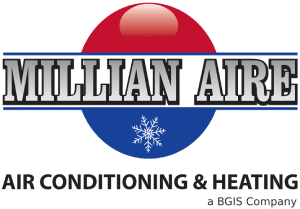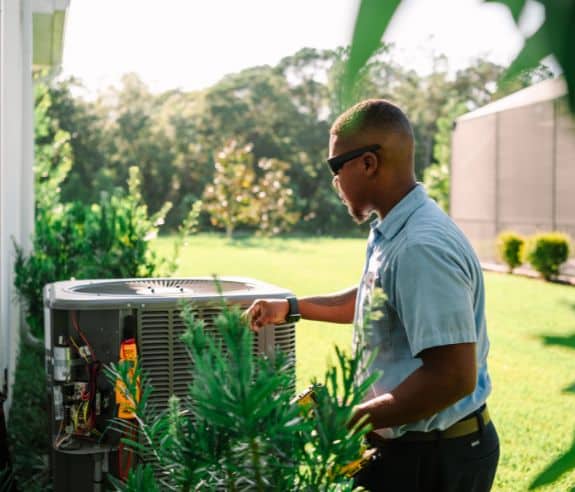Many of us are familiar with the sniffling, sneezing discomfort that the heavy pollen of spring in Tampa brings with it, but did you know your pet may also be suffering from seasonal allergies?
Pets may show signs of environmental allergies differently than we do. They most often suffer from itchy, painful skin, otherwise known as atopic dermatitis, as a result of allergic reactions to things in their environment. So, while you might react to living in Tampa, one of America’s “Allergy Capitals”, with a runny nose and sneezes, your pet will likely be scratching.
If you feel like your pet is scratching more than they used to, you might be right. Veterinary specialists have seen a noticeable rise in atopic dermatitis among dogs.
Here are some clues as to why pets are getting worse seasonal allergies than before, what you can do to make your pet more comfortable during allergy season.

Why Are Seasonal Allergies in Pets Getting Worse?
Some veterinarians believe that fluctuating temperatures and extended warm periods contribute to longer and more intense allergy seasons (source). Not only do these weather changes affect the blooming patterns of plants, but also mold spores and other allergens that thrive in humidity. Veterinary dermatologists warn pet parents that if their seasonal allergies are flaring up, their pet’s probably are as well.
Modern lifestyles have also played a role in the rise of canine allergies. Dogs who spend more time indoors and are exposed to fewer natural elements tend to have higher rates of allergies (source). This lack of early exposure to diverse microorganisms may hinder the development of a robust immune system, making dogs more prone to atopic dermatitis.
HVAC Filtration Helps Seasonal Pet Allergies
Traditional air filters capture some of the irritants that cause symptoms like itching, excessive grooming, sneezing, and even respiratory distress, but not all. Millian Aire’s specialized air filtration systems are designed to trap a much higher percentage of these airborne particles, significantly reducing allergy symptoms:
- HEPA Filtration: High-Efficiency Particulate Air (HEPA) filters trap 99.97% of particles that are as small as 0.3 microns in diameter (source), which includes most allergens, dust mites, and even tobacco smoke. HEPA filters remove the finer particles that pets shed, such as dander and hair, which helps to remove environmental allergens that are tracked in on your pet’s coat.
- Electronic Air Cleaners: These systems use electric charges to attract and trap extremely fine particles that other filtration methods might miss. Electronic air cleaners remove the smallest particles, including those to which pets are sensitive, such as specific types of pollen and mold spores.
- UV Light Purification: UV light technology inhibits the growth of mold and bacteria that can exacerbate allergy symptoms.
- Oxidation units: These units chemically alter pollutants and odors in the air, transforming them into harmless substances like water vapor and carbon dioxide.
Addressing Ductwork
Leaky or aging ductwork can undermine even the best filtration systems by introducing allergens from attics or crawlspaces. Millian Aire’s duct sealing and cleaning services employ Aeroseal technology, which seals up to 90-95% of duct leaks from the inside out, preventing conditioned air from escaping and blocking pollutants and allergens from unconditioned spaces.
Other Tips for Reducing Your Pet’s Seasonal Allergy Symptoms
- Frequent bathing can significantly reduce the amount of allergens that pets carry into the home. Use hypoallergenic shampoos that are gentle enough for frequent use without drying out your pet’s coat.
- Brush and wipe down your pet outside, before they come in, to get allergens off before they can be spread into the house.
- Regularly vacuuming with a HEPA-filter vacuum cleaner, dusting, and washing pet bedding can help reduce allergens. Pay special attention to the areas where pets spend most of their time.
- For pets particularly sensitive to outdoor allergens, consider using protective body suits designed to cover the majority of your pet’s body, preventing direct contact with allergens during outdoor activities.
- Your veterinarian might recommend medications like antihistamines, corticosteroids, or more advanced treatments like Apoquel and Cytopoint, which target specific pathways related to allergic inflammation.

Call Us Today
While spring allergies in Tampa likely cause you some sneezing and sniffling if you have allergies, your pet’s itchy and irritated skin likely points to their reaction to seasonal allergies. While you express your allergies differently, the solution for both you and your pet may well be the same.
Millian Aire’s advanced HVAC solutions, including HEPA filtration, electronic air cleaners, UV light purification, and oxidation units, are designed to tackle seasonal allergies. You and your pet may not be able to completely escape seasonal allergies, but at least your home can be a refuge from symptoms.



